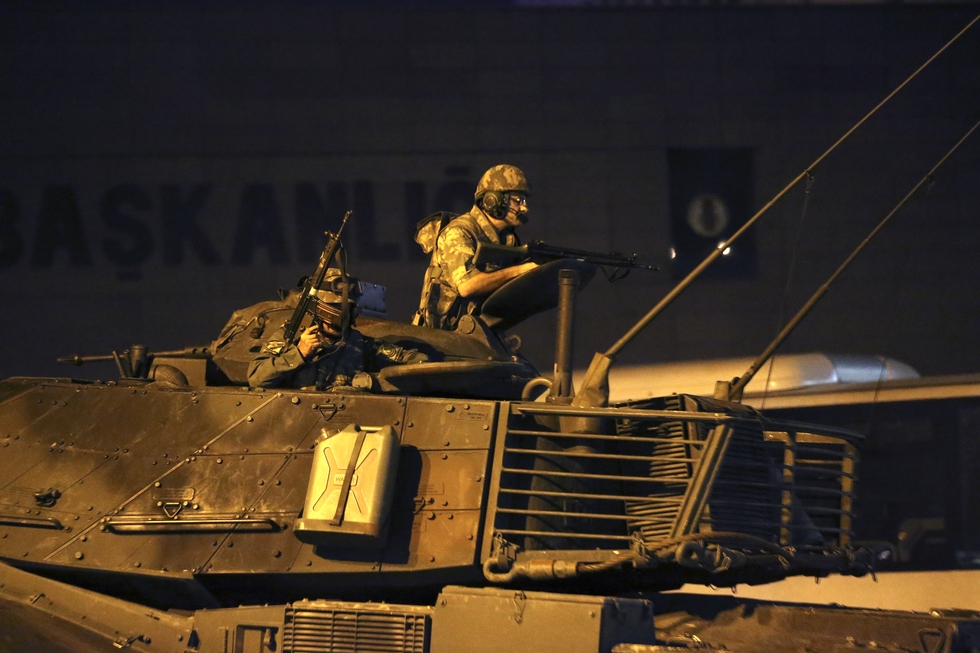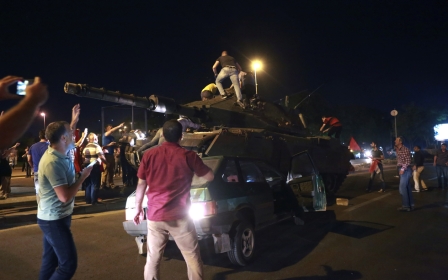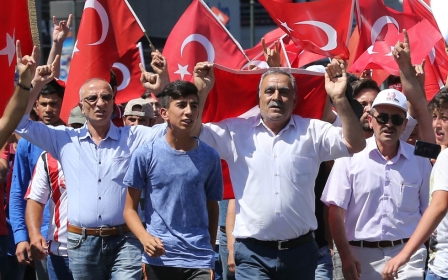Erdogan wins, but Turkey will not easily recover from this plot

Turkey’s failed coup attempt on Friday evening gives President Recep Tayyip Erdogan greater authority and will be followed by a widening crackdown on his opponents, particularly the US-based Gulen movement. But it leaves the country tense and fearful about its future.
The attempted coup launched by groups of junior officers on Friday evening has almost certainly opened a new chapter in Turkey’s political history, one in which the country’s powerful president will have an even stronger hand against his opponents.
The bid for power launched on Friday evening did not conform to the political science requirements for a successful coup and was almost certainly doomed from the outset, since it failed to black out broadcasting and social media, impose a military presence on the streets, or round up the country’s civilian politicians, all essential steps for anyone trying to seize control of a country.
Though some planes buzzed low over Ankara on Friday – following traditions established in the 1960s - and even bombed near the presidential palace, on the ground this coup attempt seems to have been mainly the work not of the air force but of the gendarmerie and of relatively lowly junior officers, ranking between colonel and lieutenant.
However a former air force commander, General Akın Ozturk and his son-in-law Lieutenant Colonel Hakan Karakus have been named as founders of the organisation and will apparently stand trial.
The core conspirators seem to have numbered fewer than 140 and to have lacked the seniority to make plausible national leaders who could have won over the rest of the military and run the country on a stable basis. In this respect, Friday’s conspiracy was completely unlike Turkey’s last real military takeover in 1980, which was headed by the top commanders.
This time the head of the general staff, Hulusi Akar, was unceremoniously seized and locked up for 10 hours by the coup forces.
Just why any group of officers was sufficiently disaffected to try to oust the government at this time is also not clear, though the ministers of Erdogan have their own answer.
They believe that the conspirators belong to the Fethullah Gulen brotherhood, a US-based Sufi group which in late 2013 tried to get corruption charges launched against the government by their members in the judiciary, prosecutors and police.
These efforts were soon squashed, and Gulen supporters were reassigned, dismissed, or in some cases prosecuted.
Since then the government has viewed them as an enemy at least as serious as its two most deadly armed foes, the Islamic State, which has carried out bombings across the country, and the Kurdistan Workers' Party (PKK), the militant Kurdish movement which has killed over 600 police and soldiers this year.
Presumed supporters of Gulen have been arrested in regular batches this year – 865 were detained in the month from 10 May with 278 arrested; and in recent weeks arrests have concentrated on members of the armed forces.
The government says 700 members of the armed forces below officer rank have given themselves up. It also says that Air General Ozturk, the alleged head of the conspiracy, was in communication with the Gulen movement and "pressed the button" for the coup attempt last night.
Just why the bid for power went ahead before midnight at a time when most adult Turks have not yet even gone to bed is one of the unexplained mysteries of the last 24 hours. If the coup had been led by a senior general with personal memories of the professional way the 1980 coup was handled, it is surprising that it was such a botched job.
With no media blackout and no politicians arrested, the balance of power had shifted firmly back to President Erdogan and the AKP government by the middle of the night, but unlike Turkish coups in previous decades, this one had encountered opposition in both Ankara and Istanbul and there had been bloodshed – the government says 161 people died, many of them police, during clashes in Ankara and Istanbul, while a further 1,440 had been injured.
There were even reports of attacks by civilians – who took to the streets to defend Erdogan and his government - and there are reliable reports that a 20-year old soldier was beheaded by a group of militant protesters.
Despite resistance in several buildings, including the offices of the Chief of General Staff for most of Saturday morning, by midday, Hakan Fidan, the head of Turkey’s intelligence services, was able to declare that operations were over.
But the work of cleaning up after the coup continues and the circle of arrests has now moved beyond the military to the judiciary, with 10 members of Turkey’s Council of State, the supreme legal body, and the Court of Appeals (Yargitay) being detained, and 2,745 other senior judges removed from their post.
This follows the recent passage of legislation giving the government much more direct control over the top judicial bodies, a move which opposition parties claim removes their independence and one which in the light of the trials that will follow the coup, assumes much greater importance than anyone could have foreseen a week or two ago.
One question that is particularly urgent is the degree to which the removal of suspect officers and soldiers might reduce the military capacity of armed forces simultaneously fighting a remorseless battle against Kurdish militants and IS, and also having potential involvement in the war against Bashar al-Assad in Syria.
There are some signs that the tensions of these conflicts could have had something to do with the military conspiracy.
In the troubled southeastern provincial city of Sirnak, 309 officers and men, headed by a brigadier, were reportedly arrested around midday on Saturday and accused of involvement in the coup, and a further 200 seem to have been detained in the regional capital Diyarbakir.
The most likely explanation for these events, if confirmed, is that troops and officers saw themselves as virtual cannon fodder in an unwinnable war which claimed huge numbers of casualties.
In this confused and dangerous situation, Erdogan can take satisfaction both at the loyalty of the police force and much of the army, and also that his civilian party political opponents chose to stand with him and the AKP and confront the coup-makers in the defence of democracy, despite their political differences.
But the recent spate of terrorist attacks has already made Turkey into a tense and fearful society.
The experience of a bloody, even if amateurish and unsuccessful, military coup seems certain to ratchet up the fears of ordinary Turks still further and the sense that the country is drifting ever further away from the unique internal stability it once enjoyed in the Middle East.
- David Barchard has worked in Turkey as a journalist, consultant, and university teacher. He writes regularly on Turkish society, politics, and history, and is currently finishing a book on the Ottoman Empire in the 19th century.
The views expressed in this article belong to the author and do not necessarily reflect the editorial policy of Middle East Eye.
Photo: A tank drives on streets in Ankara, Turkey as people protest against military coup on 16 July (AFP).
This article is available in French on Middle East Eye French edition.
Middle East Eye propose une couverture et une analyse indépendantes et incomparables du Moyen-Orient, de l’Afrique du Nord et d’autres régions du monde. Pour en savoir plus sur la reprise de ce contenu et les frais qui s’appliquent, veuillez remplir ce formulaire [en anglais]. Pour en savoir plus sur MEE, cliquez ici [en anglais].




